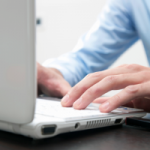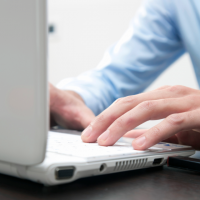
This
post was originally published on
this sitehttp://chriskresser.com/

Do you find yourself experiencing any of the following?
- You get to the end of a day and you feel like it was all a blur. In fact, you can barely remember what happened.
- You often feel distracted and have trouble focusing.
- You are constantly checking your email, text messages, or social media accounts—even when spending time with loved ones, on vacation, or out in nature.
- You feel overwhelmed and anxious and are never able to fully relax.
- You never feel like you’re getting enough done, and yet there’s so much more you have to do.
- The boundaries between work and your personal life have blurred to the point where they hardly exist.
If you were nodding your head as you read those, there’s a good chance you’re in danger of having what author Max Strom called a “near-life experience” in his recent book There Is No App for Happiness.
We’ve all heard of near-death experiences, but what is a near-life experience? I would define it as a life characterized by distraction, disconnection, and dissatisfaction. It’s a life that doesn’t feel fully lived; a life that we are not completely engaged in and present with; a life that leaves us feeling that something is missing, despite how relentlessly busy we are.
A near-life experience has unfortunately become the default for many of us living in the modern, industrialized world. Advances in technology have led to unprecedented access to information and communication. But this “hyperconnectivity” has not increased our happiness, improved our relationships, or created more meaning and fulfillment in our lives.
With this in mind, what steps can we take to avoid a near-life experience and lead richer, more fulfilling, and happier lives? Here are six of the steps I’ve found to be most important in my own experience.
#1: Be mindful
Mindfulness is a concept that was originally derived from Buddhist philosophy, but you don’t have to be a Buddhist to practice and benefit from it. In fact, mindfulness is now being taught and practiced in hospitals and outpatient clinics, Fortune 500 companies, schools, prisons, and the military.
Mindfulness simply means being aware of your thoughts, feelings, bodily sensations, and surrounding environment on a moment-to-moment basis. It means paying attention to what is, rather than getting lost in our thoughts about the future or the past.
A large body of evidence has shown that practicing mindfulness—even for a short time—increases positive emotions while reducing negative emotions and stress. (1) It also helps us tune out distractions and improve our ability to focus. (2) It enhances our relationships, makes us feel more connected and relaxed, and boosts our compassion for ourselves and others. (3, 4)
Here are a few simple tips for getting started with mindfulness practice, from psychologist and mindfulness teacher Jon Kabat-Zinn:
- Pay close attention to your breathing, especially when you’re feeling intense emotions.
- Notice—really notice—what you’re sensing in a given moment, the sights, sounds, and smells that ordinarily slip by without reaching your conscious awareness.
- Recognize that your thoughts and emotions are fleeting and do not define you, an insight that can free you from negative thought patterns.
- Tune into your body’s physical sensations, from the water hitting your skin in the shower to the way your body rests in your office chair.
There are numerous ways to learn more about mindfulness and deepen your practice. Jon Kabat-Zinn’s Mindfulness Based Stress Reduction (MBSR) Program is a great place to start. You can take an 8-week class at many locations across the US, or learn online. My 14Four program, which helps you optimize your diet, sleep, physical activity, and stress management in 14 days, has several mindfulness tutorials on audio and video. And this link has some additional resources and videos worth checking out.
#2: Stop multitasking (it doesn’t work anyway)
Most people who multitask would tell you they do it because it makes them more productive. On the surface, this makes sense. If you can check your email and respond to Facebook posts while you’re working on that important report, you’ll get more done in a shorter time. Right?
Wrong. Studies have found that so-called “multitaskers” have trouble tuning out distractions and switching tasks compared with those who multitask less. There is also some evidence that multitasking may weaken cognitive ability. (5)
In fact, the very idea of multitasking is a myth. According to the late Stanford neuroscientist Clifford Nass, multitasking should really be called “multi-switching” because the human brain does not have the capacity to focus on several tasks at once. If you are multitasking, you are simply switching back and forth between tasks very quickly.
What’s more, a study by Nass found that media multitasking is associated with negative social well-being and social indicators. (6)
All of this suggests that you’ll not only be happier, but also more productive if you just focus on one thing at a time. So the next time you’re writing a paper or working on a project, close your email and social media accounts and turn off the TV.
#3: Batch your email and social media
A recent survey found that three-quarters of workers reply to email within an hour of receiving it, and on average employees check their email 36 times an hour. The average person picks up their phone and interacts with it 221 times a day. Frankly, it’s remarkable that anyone can get anything done considering these statistics.
Not surprisingly given the multitasking information I shared above, reducing the frequency of checking your email and social media accounts has been shown to reduce stress and increase productivity.
At some point we all seemed to accept the idea that we are somehow obligated to respond to an email as soon as it’s sent to us, and it’s a good idea that we be notified immediately when we receive an email. I think it’s time to question both of these ideas.
In Part One of my two-part podcast about increasing productivity, I recommended “batching” email and social media into 2–4 discreet periods a day, instead of checking them continuously throughout the day. This single step has increased my productivity dramatically, in addition to relieving stress and improving the quality of my experience. Try it!
#4: Turn off notifications on your phone and computer (and iWatch if you buy one)
Both smartphones and more recently computer operating systems have the capacity to notify you when just about anything happens—from someone replying to your Facebook post, to someone sending you an email, to an artist you like releasing a new album, to a file being uploaded to a Dropbox folder you share with someone else. The more applications you have on your phone or computer, the more often you will be notified. And since these notifications are usually turned on by default, unless you turn them off you can quickly find yourself receiving 10-20 notifications per hour.
Each time you are interrupted by one of these notifications, your attention is distracted from whatever it is that you’re doing. This is the opposite of mindfulness, and it’s a recipe for feeling frazzled and overwhelmed. It’s almost like a constant interruption machine that was specifically designed to throw us off track.
Of course there are certain notifications which can be very helpful (like appointment reminders), and there are some cases where certain people will need certain notifications. You will know what those are. What I’m questioning here is whether you really need to know if someone responded to your Tweet when you’re playing with your son or daughter, whether someone liked your Facebook post when you are hiking in the woods, or whether someone you follow on Instagram uploaded a new picture while you are out to dinner with your partner.
This is one of the concerns I have with the iWatch. If it’s used responsibly, it can certainly make some things easier and more convenient. But it’s yet another opportunity for people to be constantly distracted if they don’t control the flow of information coming from the device.
#5: Go off the grid
Many of us are tethered to our phones and other electronic devices 24 hours a day, even sleeping with them close by. There’s no doubt that these technologies have improved several aspects of our lives, but it’s equally clear (to me, at least) that we’ve lost something vital in the process.
When we’re constantly connected to these devices, it’s much harder for us to be mindful and present to the world around us, and it’s so much easier to become distracted and have our attention taken away from whatever it is that we’re doing. We are rarely able to sink into what we’re doing, to fully relax, to allow our time to unfold without continual interruptions and demands on our time.
This is why I’ve become such a big believer in spending regular time “off the grid”, where I don’t check email or social media or use the computer or my phone except for very basic tasks (like getting directions or making restaurant reservations). I go off the grid for one day each week, and for the past few years I’ve been taking a 10-day vacation where I also go completely off the grid.
At first it was hard, but now the only thing that’s hard about it is going back on the grid—especially after the 10-day break.
#6: Do less (but accomplish more)
One of the most important lessons I’ve learned in living a happier and more productive life is focusing on what is most important and letting the rest go. This has meant learning to say no to projects and tasks that are not important.
This has evolved into a regular practice for me, with monthly, weekly, and daily attention. Each month I sit down and identify the five most important projects or goals that I want to accomplish for that month. At the beginning of each week I then identify the tasks that I can do that week that will move me closer to finishing those projects or achieving those goals. And at the start of each day, I list the three most important tasks that I can do that day.
This ensures that I am focused on only the tasks that matter to me. It also helps me to be clear on what I will say “yes” to, and what I will say “no” to. If I receive an offer or opportunity that might be interesting in some way, but doesn’t get me closer to accomplishing my goals and my purpose, I say no.
I’ve found that with this heightened focus, I’ve been able to do less—but accomplish a lot more.
Now I’d like to hear from you. Do you feel like you’ve been having a “near-life experience”? Which of these suggestions, if any, do you think might be helpful? Are you willing to commit to one of them for the next week? Let us know in the comments section.




 This
This 

 This
This 

 For now classes are 6pm and 640pm at 2840 Wildwood st in the Boise Cloggers studio.
Book your class NOW!
click this ==>
For now classes are 6pm and 640pm at 2840 Wildwood st in the Boise Cloggers studio.
Book your class NOW!
click this ==>








